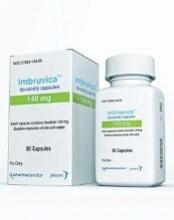Health Canada has approved the BTK inhibitor ibrutinib (IMBRUVICA®) for the treatment of patients with steroid-dependent or -refractory chronic graft-versus-host disease (cGVHD).
This is the sixth approval for ibrutinib in Canada.
The drug is approved as monotherapy for patients with previously untreated chronic lymphocytic leukemia (CLL), CLL patients who have received at least 1 prior therapy, patients with Waldenström’s macroglobulinemia, and patients with relapsed or refractory mantle cell lymphoma.
Ibrutinib is also approved for use in combination with bendamustine and rituximab for the treatment of CLL patients who have received at least 1 prior therapy.
Ibrutinib is co-developed by Cilag GmbH International (a member of the Janssen Pharmaceutical Companies) and Pharmacyclics LLC, an AbbVie company. Janssen Inc. markets ibrutinib in Canada.
The approval of ibrutinib to treat cGVHD is based on results of a phase 2 trial, which were presented at the 2016 ASH Annual Meeting.
The trial included 42 patients with a median age of 56 (range, 19 to 74). The most common underlying malignancies that led to patients’ transplants were acute lymphocytic leukemia, acute myeloid leukemia, and CLL.
At baseline, the patients had persistent cGVHD symptoms despite receiving standard treatment with corticosteroids. Most patients’ symptoms included mouth ulcers and skin rashes, and more than 50% had 2 or more organs affected by cGVHD.
The median time since cGVHD diagnosis was 14 months, the median number of prior cGVHD treatments was 2 (range, 1 to 3), and 60% of patients had a Karnofsky performance score of ≤ 80.
Fifty-two percent of patients were receiving ongoing immunosuppressants and systemic corticosteroids at baseline.
Sixty-seven percent of patients responded to treatment with ibrutinib, and 21% had a complete response. In 48% of patients, responses lasted for 5 months or longer. Responses were seen across all organs affected by cGVHD (ie, skin, mouth, gastrointestinal tract, and liver).
The patients’ median steroid dose was reduced over time, from 0.31 mg/kg/day at baseline to 0.14 mg/kg/day at week 48. Five patients were able to completely discontinue corticosteroids while in response.
The most common (≥20%) adverse events (AEs) of all grades were fatigue (57%), bruising (40%), diarrhea (36%), stomatitis (29%), muscle spasms (29%), nausea (26%), hemorrhage (26%), and pneumonia (21%).
Atrial fibrillation (grade 3) occurred in 1 patient (2%). Serious AEs occurred in 52% of patients. The most common serious AEs (2 or more patients) were pneumonia, sepsis (septic shock), cellulitis, headache, and pyrexia.
There were 2 fatal events, a case of pneumonia and a case of pulmonary aspergillosis.
Twenty-four percent of patients discontinued ibrutinib due to AEs. The most common AEs leading to discontinuation were fatigue and pneumonia. AEs leading to dose reductions occurred in 26% of patients.
The recommended dose of ibrutinib for cGVHD is 420 mg (three 140 mg capsules) once daily.


